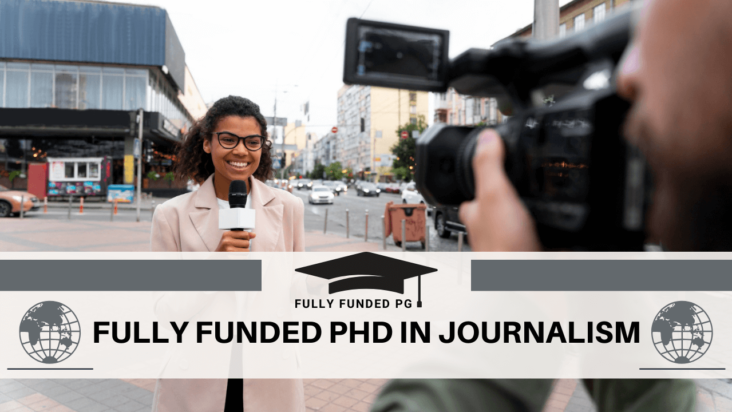Fully Funded PhD in Journalism in UK
Pursuing a PhD in Journalism is a significant academic milestone for students and professionals in the media and communications industry. The course itself, with all its importance and advantages, comes with financial concerns, as the cost of a full PhD degree can be overwhelming to most people.
Fortunately, there are several universities in the United Kingdom that offer fully funded PhD programs in Journalism. These institutions provide full financial support on tuition, research projects, teaching assistantships, and stipends to ensure that all monetary costs are well catered for, and students can then focus entirely on their studies or research.
In this article, we will be highlighting four of the best universities in the UK that provide fully funded PhD programs in Journalism that would be ideal for your academic pursuits. Whether you’re planning on venturing into an academic career or taking on corporate roles in your field of specialization, these programs would provide all the necessary academic and research support you need to achieve your goals and make an impact in the world of journalism.
1. University of Sheffield
The University of Sheffield is one of the top research institutions in the UK. It is a member of the prestigious Russell Group. Its Department of Journalism Studies is ranked among the best in the world for media and communication research and has a widely known reputation for its contribution to investigative journalism, press freedom studies, and media ethics. The department has close links with media organizations such as BBC, Reuters, The Guardian, and The Financial Times, ensuring that PhD students engage with real-world media issues.
Sheffield University offers a vibrant student environment with state-of-the-art media labs, TV and radio studios, and digital newsrooms. The city itself is a mix of modern and historical influences, making it an exciting place for journalism research. It is home to The Centre for Freedom of the Media (CFOM), a leading research center that focuses on press freedom, media law, and the impact of digital transformation on journalism.
University of Sheffield offers a fully funded PhD in Journalism program through The White Rose Doctoral Training Partnership (WRDTP), which covers full tuition and provides a stipend of around £18,000–£20,000 per year. The PhD program covers a wide range of research areas in investigative journalism, digital media, political journalism, and disinformation, including media law, ethics, and freedom of expression, exploring legal protections and ethical challenges in journalism.
Application Deadline: typically around January or February.
2. Cardiff University
Cardiff University’s School of Journalism, Media and Culture (JOMEC) is one of the UK’s leading journalism research institutions, known for its research in news reporting, political communication, and media policy. The university has strong ties with the BBC, Al Jazeera, ITV, and The Guardian, giving students access to world-class journalism professionals and research collaborations.
The School of Journalism is located in Cardiff’s Central Square, near BBC Wales and other major media hubs, providing a stimulating environment for media research. Cardiff itself is a lively city with a rich cultural scene and a growing digital media industry. The school houses The Centre for Journalism, Media and Democracy (CJMD), which explores media influence on politics, public opinion, and policy-making.
The school offers a fully funded PhD program in Journalism through the Economic and Social Research Council (ESRC), which is in line with the Wales Doctoral Training Partnership. This program covers tuition and provides a stipend of around £19,000 per year, as well as additional funding for travel, conferences, and fieldwork. The program also includes teaching and research assistantships, allowing students to gain professional teaching experience.
The school offers interdisciplinary research opportunities in digital Journalism and AI in Media, as a study of the impact of AI and machine learning in news production, Public Trust in Journalism, broadcast, and Political Journalism, which researches media influence on election campaigns and political debates.
Application Deadline: February every year
3. University of Westminster
The University of Westminster is known for its practical and research-oriented journalism programs. Its Communication and Media Research Institute (CAMRI) is one of the top research centers in the UK, focusing on media policy, global journalism, and digital communication.
Westminster has strong partnerships with BBC, The Times, The Independent, and Reuters, providing students with networking and collaboration opportunities. Located in central London, Westminster provides access to major media hubs and international journalism organizations. The university has advanced newsrooms, broadcasting studios, and podcasting labs, ensuring PhD students can conduct both theoretical and practice-based research.
The university is home to The Africa Media Centre, which specializes in media development and press freedom in African nations, making it an excellent choice for students interested in international journalism. The PhD program focuses on Global Journalism and Media Policy, examining how media regulations shape international journalism. It also touches on social media and digital news as an innovative research project on the role of social platforms in shaping news consumption.
Westminster offers fully funded PhD scholarships through the Quintin Hogg PhD Research Studentship, covering tuition fees and an annual stipend of around £17,000–£19,000.
Application Deadline: March annually
4. University of Leeds
The School of Media and Communication at the University of Leeds is a leading institution for journalism research, known for its work in media ethics, digital storytelling, and investigative journalism. Leeds has strong partnerships with BBC, Channel 4, The Guardian, and The Financial Times, making it an excellent choice for journalism research.
The university provides access to cutting-edge research centers, podcasting labs, and digital newsrooms. Leeds itself is a major media city, home to Channel 4’s regional headquarters and other major broadcasting companies. The school also houses The Centre for Digital Methods and Media Ethics, which explores ethical dilemmas in modern journalism.
The PhD program at Leeds University School of Media and Communication covers Media and Journalism Ethics, which investigates ethical issues in investigative reporting, AI and Automation in Journalism, which studies the impact of AI-generated news, Public Service Journalism, which explores how media serves democracy, and media Influence on Public Perception, which analyzes how news shapes social and political attitudes.
The School of Media and Communication offers a fully funded PhD program in Journalism, which covers tuition and a stipend of around £18,000 per year, research grants for international journalism projects, and teaching assistantships for PhD students. Check out the scholarship program here.
Application Deadline: March.
Disclaimer:
The term “fully funded” is used to address a financial aid package where a student’s educational expenses are being taken care of. This may include;
- Full tuition payment: The total cost of tuition has been waived.
- Stipend/ Salary: A pre-agreed allowance is given to the student to cover living costs and other expenses during the program.
However, It is important to note that this is totally dependent on several factors such as lifestyle, cost of living, location, and other financial needs. Sometimes, the term “fully funded” is used by some programs even though they don’t provide for all your financial needs, expecting that you see them through part-time work, intensional, or personal savings.
These programs usually expect students with fully funded offers to teach and conduct research while studying as part of the funding arrangement. It is also important to note that all universities offer full funding, and students should, therefore, explore financial aid opportunities from various schools (including less popular and well-known ones) in order to find the one that perfectly meets their financial needs.

